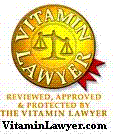"Supporting Industry Compliance with FDA and FTC Regulations."
Page Index:
· Index
· Contact Me
· Top
The Vitamin Lawyer Consultancy
www.vitaminlawyer.com
Ralph Fucetola JD
|
|
The Vitamin
Lawyer.com Consultancy What Dietary Ingredients are Permitted under DSHEA? The Dietary Supplement Health and Education Act of 1994 (DSHEA) contains several clauses relating to what ingredients are permitted for Dietary Supplements. This includes a “grandfathering” clause that provides a safe harbor for dietary ingredients marketed before certain dates. This means those ingredients do not have to receive safety review approval from FDA prior to marketing them. The relevant clauses in the statute are: In general (Section 3, Definitions, clause a) - “The term "dietary supplement" -
Section 8 -
There is, though, an exception to that rule, found in Section 3 of the Act, the Definitions section, where it limits the definition to exclude certain dietary ingredients that were approved as prescription drugs, or for which there was an authorized public new drug investigation. In that case, it can still be grandfathered if it “was, prior to such approval, certification, or license, marketed as a dietary supplement…” Thus, the grandfathering date is October 15, 1994 for most dietary ingredients, but an earlier date for those foods that were approved or investigated as drugs before that date. A key concept here is, in addition to “ordinary” vitamin and mineral substances such as Vitamin C that were sold to supplement the diet prior to the grandfathering date, a number of more exotic substances can also be protected under DSHEA. Thus, any “a concentrate, metabolite, constituent, extract, or combination of any ingredient…” that was “present in the food supply as an article used for food in a form in which the food has not been chemically altered…” can qualify to be grandfathered under DSHEA. Additionally, such food substances that were not present in the US food supply in 1994 may qualify as New Dietary Ingredients after approval by the FDA so long as there is a “history of use or other evidence of safety…” Therefore, for example, exotic herbs and other plants that were available even in limited amounts in specialty or ethnic shops in the US can qualify as dietary ingredients for dietary supplement sale. The status of such exotics will depend on two factors, (1) when (and if) they were investigated as new drugs and (2) are they "a concentrate, metabolite, constituent, extract" of a food substance that has not been chemically changed? In general such ingredients are plant based extracts that would have been available as part of the food supply prior to 1994 and can therefore be sold to supplement the diet, but cannot be sold to "to diagnose, mitigate, treat, cure, or prevent a specific disease or class of diseases" (DSHEA Section 6). © 2008 v12.10.08 |
Breaking News!
Vitamin Lawyer News
|
cGMPs & SoPs are Coming to the Vitamin
Industry! |
Vitamin Lawyer On Line Seminar - FREE!
Ralph Fucetola JD
Email me with questions: |
Look for the Vitamin Lawyer Oversight Seal of Approval on Nutrient Web Sites
|
|
Your web site needs a proper SUS |
|
SUPPORT LIFESPIRIT This site hosted on the net by LifeSpirit Center This site makes no representations regarding these offers. |
© 2007
Powered by
counter.bloke.com
![]()
Web Site Index:
·
Home
Page
·
Credentials
·
Services
·
Payments
·
SOPs
·
SUS
·
Forming a Company
·
Vitamin Lawyer News
·
FDA - FTC Regs
·
Links
·
International Services
·
Nutrient Picks
·
Consumers
·
Personal Importation
·
Professional Seminars
·
FREE
Online Seminar
·
Vaccine Choice
·
Site Use Statement
·
Site Map
·
Top
·
Home
Page
·
Credentials
·
Services
·
Payments
·
Oversight Seal ·
Site Use Statement
·
Top

